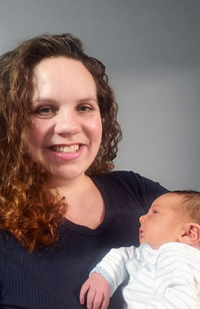Judge’s Baby Arrives Early during Judicial College Course

Ashtabula County Court Judge Michelle Fisher holding her newborn son, Connor.

Ashtabula County Court Judge Michelle Fisher holding her newborn son, Connor.
Judges must juggle multiple responsibilities, but one jurist took that notion to a much higher level.
She gave birth in the middle of a weeklong judicial education program of the Ohio Supreme Court.
Ashtabula County Court Judge Michelle Fisher’s third child, Connor, arrived in the middle of a new judges orientation held via videoconference.
“He decided he didn’t care about my schedule,” Judge Fisher said.
The due date was last Friday, at the end four consecutive days of intensive judicial learning. Instead, Judge Fisher went into labor Tuesday night and Connor introduced himself to the world the next morning.
Hours later, Judge Fisher was back online, continuing the virtual orientation from her hospital bed.
“Those couple days were hectic, but my husband and I have a good system,” Judge Fisher said. “Fortunately, you get enough breaks to do what you have to do – sometimes while holding a baby.”
It’s not the first time Judge Fisher has managed multiple life changes while transitioning to the bench. Three years ago, amid closing her private practice to become a magistrate for Ashtabula County Common Pleas Court, she had her second son, Ethan.
Judge Fisher compared those sudden changes and the sense of being overwhelmed to her first judicial orientation in March, shortly after her appointment to the county court seat.
Ohio judges, elected and appointed, must complete mandatory orientations – one in the spring and one in winter – taught by the Ohio Supreme Court’s Judicial College. These sessions provide initial training for the bench and expose those assuming judgeships to the Court’s resources and staff.
“I felt like a deer in the headlights with 100 things going on at once,” Judge Fisher said.
Prior to the pandemic, the 35 participants for the most-recent orientation would have met at the Supreme Court in Columbus, allowing the group to become better acquainted in person. Due to public health precautions, these gatherings have remained virtual.
Cyber sessions don’t require jurists and soon-to-be judges to be away from their courts or offices for days, so attendees are able to manage their daily tasks and backlogs.
Since this was her second round of Judicial College orientation, Judge Fisher said, she absorbed more information, despite the hectic week.
“I’ve got the basics now and was able to relate more to what the presenters were talking about,” she said.
Diverse Viewpoints Enhance InsightAnother new judge can attest to the value of having more knowledge about the day-to-day court operations before receiving an in-depth education from fellow jurists.
Judge Natasha Kennedy has served Logan County Family Court as a jurist since her appointment in August. Her familiarity with the court goes back two more years in her previous role as a magistrate.
Comfortable with the essentials of her position, Judge Kennedy’s orientation allowed her to “better understand the little nuances in the law” from seasoned judges who instructed on varied topics across four days.
Judge Kennedy also appreciated the assorted perspectives from the mentoring jurists, gaining further insight as to how courts of differing sizes function.
“You hear from judges who’ve been doing it for a very long time, who really care about how we perform,” Judge Kennedy said. “They’ve seen most things, and if they haven’t, they have an idea of how to handle different situations.”
Legal Disclaimer:
EIN Presswire provides this news content "as is" without warranty of any kind. We do not accept any responsibility or liability for the accuracy, content, images, videos, licenses, completeness, legality, or reliability of the information contained in this article. If you have any complaints or copyright issues related to this article, kindly contact the author above.
